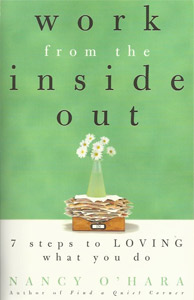Follow the Leader
…continued from 7 Steps to Loving What You Do – Discovery 1:3 – Things Change
In Western culture we are conditioned to praise the individual on the one hand and to be like everyone else on the other. As children we are taught how to fit in, follow the rules and play as a member of a team. But it is always the outstanding individual who gets the special attention and accolades. We are told to follow the leader and many of us vie for that coveted front spot. And if we are too far behind or too shy or simply not aggressive enough to get noticed or to fight for the front row, we often begin to resent the person in the spotlight and grow up feeling “less than.” The effects of such conditioning are not always obvious. By the time we become aware of these influences they are such an integral part of who we have become that we can’t easily isolate them. But if we learn to pay attention in the here and now we can heighten our awareness and lessen their impact.
Because modern society extols and honors the successful individualist, many of us feel left behind. Even in team sports, it is the exception rather than the rule that the team is praised first. Most likely one or two individuals on the team are credited with the team’s success. Michael Jordan is a perfect example. Granted, he was an extraordinary athlete. And most people know that without his teammates he could not have done what he did half as well. But the discrepancy between his and his teammates’ fame and money was staggering. Yet we accept it as the way of the modern world and rationalize that he deserved such riches because he was gifted and entertained us. We try to pretend that it doesn’t bother us. But the seeds of greed and envy may be sown when a co-worker gets a promotion and raise and leaves us behind, or when we meet someone who loves his or her work, makes more money than we do and has a happy, contented love relationship.
We can’t help but compare ourselves. We might see these people as the chosen ones, the leaders, as the ones destined to get all the breaks. We become angry and embittered. Most likely we are not even aware of how these feelings combine to color our perception.
We simply know that we are dissatisfied. All of this bitterness can turn inward, sowing self-hatred. Little do we know how these feelings prevent us from loving anything or anyone, or how they cause us to look toward others to save us, and when they don’t, to blame them for our condition.
So the first thing that we have to look at is what is going on internally—not what is going on internally for your neighbor, your co-workers or for Michael Jordan, but for you. The second thing to understand is that the externals, in the end, mean nothing. They contribute nothing to our spiritual understanding of the world (except as they might offer to teach us something) and only work to separate us from each other. When all the externals are stripped away we are left with what makes us human, and in that state we are all equal under the laws of the universe. And it is with this raw material that we can make a difference in the world.
We have some control over how we use the raw materials we’ve been given (our hearts and minds for instance) and if we can learn to keep our focus on this, on our own individual selves, then we can find happiness in our work, in our lives.
We can learn to contribute to the world what we were meant to contribute, without resentment. We can learn to appreciate what we have, acknowledge that it is enough, and be grateful for it.
If you’re thinking that all of this sounds too lofty and spiritual and has nothing to do with making a living and liking one’s job, I will pose a challenge and make you a promise. If you are willing to suspend for a short time your traditional notions of what making a living means, what your job or your work or your career is or should be, and what money can do for you, and if you approach the material in this book with sincerity and an open mind, and if you take the suggested steps here and do all of the exercises, I promise that you will find happiness in your daily work life and know instinctively how to handle the challenges that life presents. All lingering self-hatred and resentment of others will disappear.
But—and this is where you come in—you must do the work. No one else can do it for you. No one else is responsible for your interpretation of your life. You must be honest with yourself through this process. You must stand up and move to the front row of your life. There is only one you. You are the leader here. You are the only one who inhabits your unique world. You are what matters, your life is what matters, and you can make a difference in your life.
So show up for yourself and take a risk to be fully and truly you. Stand tall in your own shoes. Walk in your own footsteps. And in the end—or even right now, in this moment—you will see that you are better than no one else and no one else is better than you. You are just you.
And while we really have no other choice but to be ourselves, being aware of being ourselves takes some courage. So be brave, be aware, be diligent. If you take it one step at a time, one small moment at a time, one breath at a time, your life will open up and you will begin to see it as the miracle that it is. Congratulations for being ready. You’ve chosen yourself. You are in the front row, following yourself as the leader of your life.
_________________________________________________
Write an appraisal of your current work situation. Be specific. Be honest. Be thorough. Don’t rush through this. Take as long as you need to complete this exercise.
- Make two lists, one of the pros, one of the cons of your job. Here’s an example:
PROS
location is ideal
subsidized cafeteria
casual dress code on Fridays
CONS
dislike my boss
bored much of the time
lousy compensation package
- Write about a recent accomplishment or a daily task that you do that you are most proud of in your work.
- Write about something you’ve done or have neglected to do at work most recently that you are least proud of.
- Describe how you think your co-workers view you and your contribution at work.
- Describe how you see yourself at work. Try to draw a balanced picture—don’t judge too harshly, don’t praise too highly. How are you as an employee? How are you as a boss? Would you want to work for you?
- Write two job descriptions, one to include what you think the responsibilities of your specific job are, the other to include what you think your boss or the company thinks your responsibilities are. How much in sync are these two views? How have the differences evolved? What is your investment in nurturing these differences? How much of a role does your ego or pride take in keeping your vision and the company’s vision separate?
_________________________________________________
As you begin this process—and keep in mind that it is a process—especially as you write down the details of your life, the details that up to now have only been in your head and heart, you will get in touch with a reality that has previously been clouded by emotions and you will begin to identify the negative emotions responsible. Some of these will include pride, jealousy, desire, ignorance, and enmity.
Go back over what you’ve written and try to get in touch with the feelings that are aroused as you think about your current work situation and the people you work with. If you can’t name a feeling, try to describe it. Write a list of these feelings and what they’re attached to.
As you sit quietly each day, accept what you’ve been feeling and look deeply into why you’re feeling these things. Without denying your feelings and without grabbing on and being carried away by them, just look, just observe, just pay attention. After you’ve sat with them write again about what else came up. Go back the next day and sit with them again. Write about them again. Keep breathing and learning about yourself, about what grabs you, what motivates you, what scares you.
Pray that you will be released from the control that your emotions have over you. Don’t judge yourself. Forgive yourself for being human.
Remember: simplicity, patience, compassion.
As you are working on this exercise pay more attention while you’re at work, and as emotions come up on the job try to take a short prayer and meditation break. Breathe your way through the day, through the emotions that get stirred up and then move into the reality of your life. For that is where you must be in order to make a change, if change is what is needed.
To be continued…
from Work From the Inside Out – 7 Steps to Loving What You Do







[…] …continued from 7 Steps to Loving What You Do – Discovery 1:4 – Follow the Leader […]